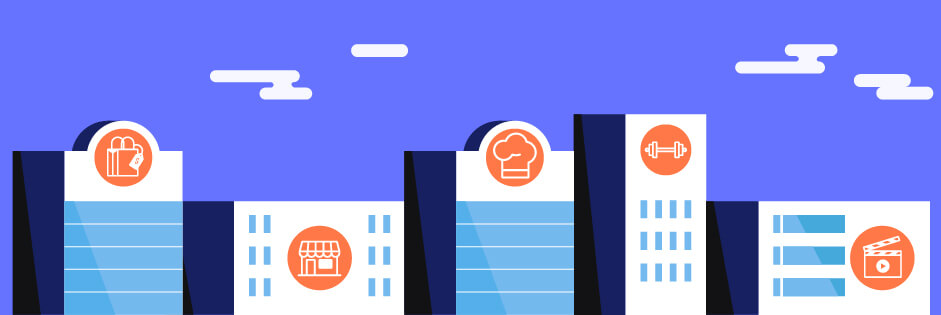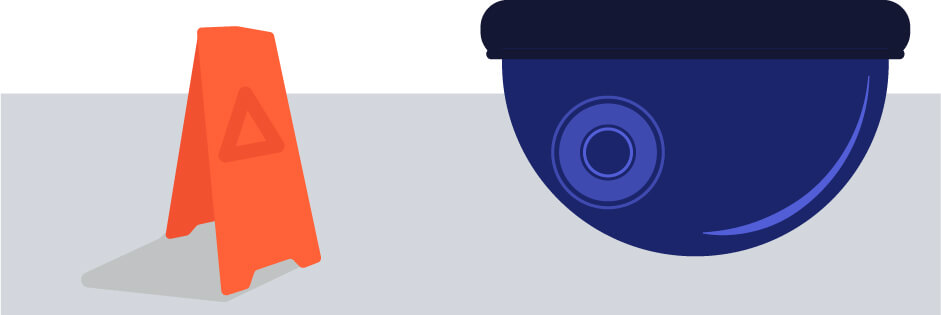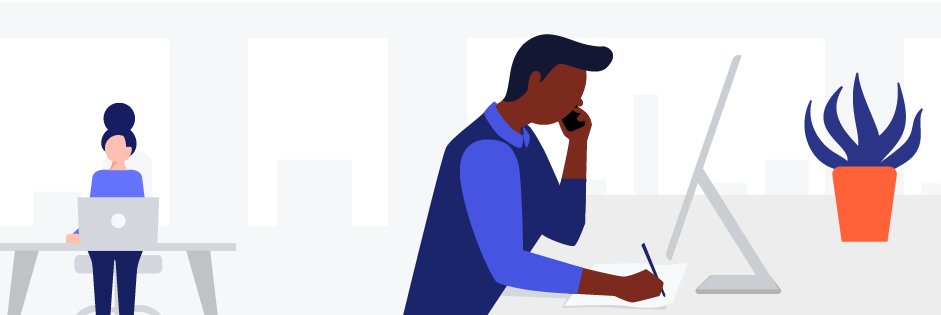How to Protect Your Business with Slip and Fall Insurance
Learn how to prevent workplace injuries and how to protect your business from slip and fall insurance claims with the right insurance coverage.
Protect your business today!
Get a QuoteAccording to a recent study, slips, trips, and falls account for in between 20-40% of disabling work injuries. They are also easily the most common causes of work-related injuries in the United States. Therefore, having coverage with the right slip and fall insurance can protect you and your business.
Despite the fact that there are, certainly, types of businesses that run a greater risk of experiencing slip and fall claims, the truth is that these types of accidents and injuries can occur on the property of any business. No matter whether these injuries occur to your employees, partners, or customers, one of the long-term effects of workplace accidents such as these on your business is that your insurance premiums will no doubt increase exponentially if they are happening regularly.
Beyond the fact that they can certainly cost your business a lot of money, injuries at the workplace can be incredibly disruptive as well. Whether you’re losing a valuable employee to injury or getting negative press from a customer injuring themselves at your place of work, having to deal with these types of incidents can be incredibly draining and their prevention should not be taken lightly.
Let’s take a look at how and why slip and fall injuries commonly occur, what you can do to minimize the chances of these injuries occurring at the workplace, and how you can protect your business in the event that these types of injuries do occur.

Common Causes of Slip and Fall Accidents
Slip and fall accidents can happen on just about any part of your business property and the causes can be manifold. Generally speaking, there are five categories that typify the most common locations and reasons associated with workplace injuries:
Human Error
A common cause that your business really doesn’t have much control over, many injuries at the workplace are the result of human error. Whether the injured person is simply not paying attention, doing something they should not be doing, ignoring warnings, or wearing improper footwear, human error-related slip and fall injuries are, unfortunately, hard to prevent or avoid.
Craters, Potholes, Ditches
This category usually relates to injuries that occur outside of your office or business space. Injuries in company parking lots are fairly common and most are caused by the existence of potholes and ditches and a lack of warning signs or markings that would indicate to people that these issues exist. Injuries can occur on any high-traffic part of your property in which has these types of holes and ditches need to be filled, covered, or fixed.
Slippery Surfaces
It’s no surprise that slip and fall accidents most commonly occur as a result of slippery surfaces at your workplace. If any surface in your workplace is wet because it has been recently cleaned, make sure that you are putting up signage to that effect as a warning. On the outside of your workplace, injuries often occur in the winter because of snow and ice accumulations. That’s why it’s important to clean and de-ice all stairways, sidewalks, and walkways as thoroughly and regularly as possible for the sake of injury prevention. Restaurants and other businesses that deal with spillage and regular clean-up efforts should be most vigilant when it comes to mitigating the risks associated with slippery floors.
Poor Lighting
Always make sure that your workspace has proper lighting both inside and out. Many slip and fall injuries occur as a result of obscured or inadequate vision due to poor lighting, especially in stairways and areas of your workplace that do not have much natural light to work with, which makes it harder for people to navigate these areas safely.
Disorganization and Clutter
This is a common problem in retail businesses and any other workplaces where there is a lot of merchandise, equipment, and inventory present at all times. In such businesses, it’s important to give a lot of attention to the way you are displaying, moving, and organizing these things, in order to make sure that they are not impeding or compromising your workers’ and your customers’ ability to move freely without inadvertently tripping over something.

The Most At-Risk Industries for Slip and Fall Claims
As mentioned earlier, truthfully speaking, all industries run the risk of having to deal with slip and fall claims. While icy parking lots, wet floors, and poor lighting can be a problem in just about any field of work, obviously, businesses with a higher level of risk tend to be those in which there are many people coming in and out of the establishment at all times. That means business locations such as shopping malls, retail stores, restaurants, movie theaters, sporting and concert venues, and gyms, for example, would definitely be considered high-risk businesses for slip and fall claims.
Regardless of your occupation and industry, talking to an experienced broker about your business’s risk profile related to the possibility of workplace injuries is something that you need to do in order to make sure that you are paying the right amount for insurance premiums based on the type of coverage that your business warrants.

Which Insurance Products Can Protect You?
Since we’ve established that slip and fall incidents can occur at just about any place of work and lead to employee and customer injuries, property damage, and possible lawsuits, let’s talk about what your business can do to mitigate these risks. The first and most obvious step to take is to talk with a broker and secure the right coverage for your business.
Here’s what you are going to need to add to your insurance program in order to mitigate risks related to slip and fall accidents at work:
General Liability Insurance: A commercial general liability policy can protect your business and its assets from injury and property damage claims. This coverage responds to claims of negligence made by a third party and is designed to cover legal costs associated with such claims. Even if your business wins its case, legal fees can be costly, which is why every business should have a broad general liability policy.
In the case of a slip and trip injury occurring at your workplace to a third party, you could be hit with a claim stating that your business and the services it provided were responsible for property, bodily, or other damages incurred. A good commercial general liability policy would be able to help your business mitigate losses, legal or otherwise, in such situations. You can get a risk-free general liability insurance quote from Embroker in just a few minutes.
It’s also important to remember that a variety of entities could be held responsible for injuries resulting from a slip or fall on business premises. For example, if the business is renting, both the property owner and tenants can be named as defendants. Additionally, if the accident resulted from a mistake made by a company that your company hired to maintain and clean your workplace, that business could be held responsible for the injuries and damages as well.
Commercial Property Insurance: What does property insurance have to do with slip and fall cases? Well, even if businesses primarily insure commercial property in order to protect their property and equipment from damages incurred, it’s important to remember that slip and fall incidents can cause significant property damage as well.
For example, a customer in a retail store could slip and fall on a wet floor and crash into and damage a very expensive display and potentially cause significant damage to your property and products. Even though commercial property insurance would not help directly pay for the costs associated with the slip and fall claim, this coverage would help you reimburse the resulting damages to your property and merchandise.
Workers Compensation Insurance: Obviously, a large percentage of slip and fall accidents involve employees and contractors, which is why every business needs workers compensation coverage. This insurance product is actually mandated by law in most U.S. states, and rightfully so. Employees need to be protected, especially those working in high-risk industries, and a quality workers comp policy will enable your business to provide them with the protection they deserve.
This insurance product covers the near and long-term costs of any staff member’s workplace-related injury or illness, paying for hospital bills, medication, physical therapy, and even lost wages. And remember, if your company provides quality coverage for its employees, the chances of being sued by employees for workplace injuries are significantly reduced since employees know they will be compensated fairly and taken care of through the workers compensation insurance product.

Preventing and Managing Slip and Fall Claims
Realistically, avoiding slip and fall accidents entirely is practically impossible. But that doesn’t mean that there aren’t things that your business could do in order to decrease the chances and eventual severity of these types of workplace injuries.
Preventive Measures
Let’s first take a look at the preventive measures that your business can take to minimize the chances of slip and fall incidents occurring:
Education and Training: One of the best ways to avoid employee accidents is to make sure that everyone on your staff is fully aware of the business hazards that are most commonly associated with slip and fall accidents. That’s why it’s a good idea to provide all of your employees with training and education regarding protocol and proper behavior they should implement in order to decrease the chances of accidents occurring. It’s a good idea to not only add this type of training to your onboarding program but to also follow up periodically with reminders that will continue to solidify their knowledge. Keeping this information top-of-mind and making sure your employees know how to recognize potential hazards and what precautions to take to avoid slip and fall accidents is vital.
Conduct Regular Inspections: Designating a staff member that is familiar with the education and training process to act as a regular inspector in your workplace is also a good idea. This person (or several people) should walk through the premises several times a day and be on the lookout for potential hazards that could lead to slip and fall accidents.
Proper Maintenance and Cleaning: While many slips and falls do occur as the result of cleaning and wet floors that aren’t properly labeled, the importance of cleaning and maintaining your workplace in order to avoid accidents is paramount. Grease, dirt, oils, and cleaning product residue can all make your floors extremely slippery.
Choose the Right Floor Surfaces: Purchasing the right flooring material for your workplace needs is also very important. Be sure to take a look at the guidance labels provided by the National Floor Safety Institute in order to see which floorings have high traction ratings in order to pick floor surfaces that are both slip-resistant and durable. Installing mats is also a very effective method of reducing slips and falls, especially at entrances. Mats can do a good job of decreasing the chances of wetness and moisture from the outside spreading through your workplace. If you do install mats, make sure that they are well-secured so you’re not turning them into tripping hazards by not installing them properly.
Mandate Slip-Resistant Footwear: While you can’t tell clients and partners what to wear on their feet when they visit your place of work (outside of banning bare feet, for instance), you can definitely mandate, or at least set expectations, for what your employees should be wearing in terms of footwear. If you’re operating a business in which slips and falls are common, such as a warehouse or a restaurant, it might be a good idea to provide all of your workers with slip-resistant footwear as it might be a cost that pays for itself if you’re significantly reducing the number of accidents and injuries that occur at your business.
Display Warnings: If you have just cleaned your floors and they need some time to dry or you notice a hazard that cannot be removed or fixed right away, then make sure you are warning and alerting your employees and customers that these hazards exist. The best way to keep people far from the hazardous areas is to install some type of barricade that will make them seek a different route when navigating your workplace. If you cannot barricade this area, at least display signage that alerts people to the issue, making sure that it is very visible and can’t be missed.
Install Surveillance Equipment: One of the best ways to stay vigilant is to install camera equipment that will enable your company to monitor your workplace and identify situations that could pose potential injury risks, allowing you to remedy those issues and prevent accidents before they occur. If a slip and fall accident does occur, having the incident “on tape” will also be important if a potential claim does arise from the accident.

What To Do If a Slip and Fall Accident Occurs
Now let’s discuss what steps your business needs to take in the event that a slip and fall accident and injury does occur:
Complete an Incident Report
Your company needs to complete and submit an injury report as soon as a slip and fall injury occurs in order to document the event properly and better identify the cause or causes of the injury. Be sure to take statements from the injured party and from eyewitnesses at the scene in order to document what happened as accurately as possible and be sure to take photographs of the scene and any of the hazards that might have been present.
Of course, having a video recording of the incident would also be very helpful for documenting the event as fully as possible. It’s a good idea to report even close calls that didn’t necessarily end in injury and to do so as promptly as possible for the sake of future prevention. Naturally, immediately filing a detailed and honest incident report will prove to be imperative if the injured party ends up filing a claim against your company.
Notify Your Insurer
You also need to notify your insurer of any incidents as soon as they occur. This is especially important if you are anticipating a claim. The sooner you notify your insurer of the injury, the faster your general liability or workers compensation policy will be able to kick in and cover the expenses of the injured party. And the sooner you talk to your insurer, the sooner you will be able to start preparing your legal defense if the injury does result in a claim being filed against you.
Check on the Injured Party
Always remember that these types of injuries are not just about being sued and being insured. These are real people, often dedicated customers, employees, and partners, who might have suffered a serious injury at your place of work.
Be sure to check in on the injured person periodically to see how he or she is doing and ask your insurance company to do the same. Beyond potential litigation, defense and settlement costs, if handled poorly, injuries that occur at your workplace could have a negative impact on the image of your company. It’s your responsibility as a business owner to make it clear to the injured party and everyone else (clients, partners, employees, etc.) that your company is committed to both taking care of people who were injured on your property and doing everything possible to avoid such unpleasantries in the future.
If you have any questions about putting together workplace injury-related insurance coverage that best fits your business’s specific needs, don’t hesitate to talk with one of our expert brokers today.
